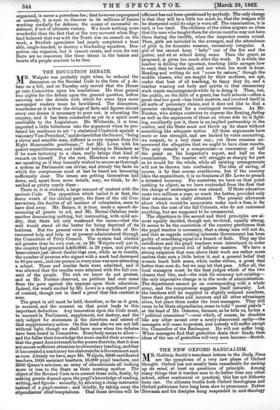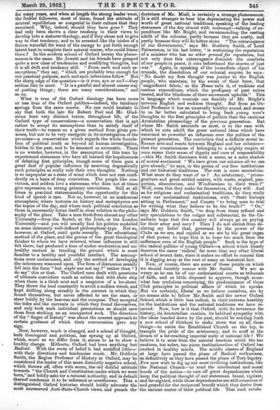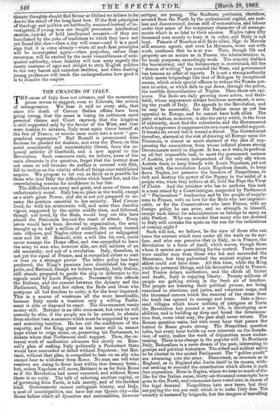THE NEW OXFORD RADICALISM.
mR. Goldwin Smith's trenchant letters to the Deity News are the symptoms of a very new phase of Oxford thought. Oxford has not usually been remarkable for making up its mind, at least on questions of principle. Among many things that it teaches men to do better than any other school, either academical or practical, this has not hitherto been one. On ultimate truths both Oxford theologians and Oxford politicians have long been slow to pronounce. Father Newman and his disciples hung suspended in mid-theology for many years, and when at length the strong leader went, the feebler followers, most of them, found the attitude of neutral equilibrium so congenial to their culture that they remained. Why, indeed, should they have gone ? They had only been shown a clear tendency in their views to develop into a maturer theology, and if they chose not to give way to that tendency, and to be arrested like the icicles of a frozen waterfall for want of the energy to put forth enough latent heat to complete their natural course, who could blame them ? In the modern school of Oxford heresy the pheno- menon is the same. Mr. Jowett and his friends have grasped quite a new class of tendencies and modifying thoughts, but it is all drift and tendency still. "From such and such as- sumptions," they say, "which are probably true enough for our practical purpose, such and such inferences follow." But the sharp edge of the question—is it true, aye or no ?—they seldom like to meet. "It is a painful and almost coarse way of putting things ; there are many considerations," and so on.
What is true of the Oxford theology has been more or less true of the Oxford politics—indeed, the tendency springs from the same source. No one could hesitate to say that both the late Sir Robert Peel and Mr. Glad- stone bore very distinct traces, throughout life, of the Oxford type of conservatism—a conservatism that is apt rather to accept its assumptions than to satisfy itself of their truth—to reason on a given method from given pre- mises, but not to be very energetic in its investigation of the premises—a conservatism which regards the whole founda- tion of political truth as beyond all human investigation, hidden in the past, and to be assumed as axiomatic. There is no wonder, however, in the assumption of this tone by experienced statesmen who have all learned the hopelessness of debating first principles, though some of them gain a great deal of popular influence by asserting dogmatically such principles as really rule their own thoughts. Nothing is so unpopular as a state of mind which does not rest confi- dently on a basis of deep conviction. The people like con- viction, and seldom love a statesman who does not at times give expression to strong primary convictions. Still at all times in practical statesmanship the opportunity for this kind of speech is rare. Not so, however, in an academical atmosphere, where lectures on history and metaphysics are the topics of the day, and where such political conviction as there is necessarily forms itself in close relation to the philo- sophy of the place. Take a man fresh from almost any other University—from the Scotch, or the Irish, or the London University—and you will usually find his politics modelled on some extremely well-defined philosophical type. Not so, however, at Oxford, until quite recently. The educational method of the place, and the genius of the great theological thinker to whom we have referred, whose influence is still felt there, had produced a tone of undue moderation and un- healthy caution in treading the ground which is most familiar to a healthy and youthful intellect. The assump- tions were undiscussed, and only the method of developing the inferences reasoned upon. The form of discussion usually fell into the form "but might one not say ?" rather than "I do say" this or that. The Oxford men dealt with questions of ultimate conviction much as sailors deal with their ship when there is a thick mist and a suspicion of a lee-shore. They threw the lead constantly to avoid a sudden wreck, and kept drifting along steadily in the current in which they found themselves but never affected to see the stars, or steer boldly by the heavens and the compass. They accepted the tides and the currents in which they found themselves, and only took such individual precautions as should save them from striking on an unexpected rock. The direction of the "finger of history" was about the nearest approach to certain guidance of which their conversation gave any sign.
Now, however, much is changed, and a school of thought, both theological and political, has sprung up at Oxford, which, much as we differ from it, seems to us to show a healthy change. Hitherto, Oxford had been anything but Radical. With the roots of belief it had meddled little--. withtheir directions and tendencies much. Mr. Goldwin Smith, the Regius Professor of History at Oxford, may be considered the leader of this more distinctly negative school, which throws off, often with scorn, the old dutiful attitude towards "the Church and Constitution under which we were born," and boldly asks for a rational authority, and in default thereof condemns it to be reformed or overthrown. That a distinguished Oxford historian should boldly advocate the most unreserved Anti-State-Church views, and preach the doctrines of Mr. Miall, is certainly a strange phenomenon. It is still stranger to hear him depreciating the power and worth of great national traditions, speaking of the leading statesmen of the day almost with contempt—talking of ex- penditure like Mr. Bright, and recommending the casting adrift of the colonies, partly because they are costly, an partly because they will do better alone. "The extravagance of our Government," says Mr. Goldwin Smith, of Lord Palmerston, in his last letter, "is sustaining the reputation of a minister who has no other ground for reputation, but not only does this extravagance diminish the comforts of our people in peace, it cuts beforehand the sinews of just war." Again, in speaking of the immediate object of his crusade, the dissolution of our colonial empire, he says : "No doubt my first thought was justice to the English people, who maintain, by the sweat of their brow, that magnificent fabric,' as the Times calls it, of reckless and useless expenditure, which the profligacy of past rulers reared, and the blindness of their successors upholds." This is language which reminds one forcibly of Mr. Bright's nervous English and reckless thought. But from an Ox- ford Professor it has an unusually healthy sound, and seems to us far better calculated to bring back young men's thoughts to the first principles of politics than the cautious Aristotelian phraseology of the previous generation. But where Mr. Smith astounds us most, is in the ease with which he cuts adrift the great national ideas which have exercised so powerful an influence over the politics of the present generation. The conviction that a definite moral in- fluence acts and reacts between England and her colonies— that the consciousness of belonging to a mighty empire at once raises their sense of dignity and ours of responsibility —this Mr. Smith dismisses with a sneer, as a mere shadow of unreal sentiment. "We have given our colonies all we can give already," he says, in the germs of our free institutions and our historical traditions. The rest is mere moonshine. What more do they want of us ? An aristocracy, "primo- geniture and great settled estates, with waste, neglect, pau- perism, absenteeism, and Windhamism in their train ?" Well, even this they make for themselves, if they will. And as for religions and ecclesiastical traditions, do they really want our ecclesiastical institutions, with "State bishops sitting in Parliament," and Courts "to bring men to trial for writing what they believe to be the truth ?" " Or," says Mr. Goldwin Smith, "to drop from these refined and airy speculations to the vulgar and substantial, do the Ca- nadians hope that this country will always go on paying for their army and navy ? Then I do not shrink from de- claring my belief that, governed by the power of the Clubs as we are, and cajoled as we are by the great organ of that power, to hope this is to hope too much from the sufferance even of the English people." Such is the type of the radical politics of young Oxford—a school which clearly deserves the name radical.' far more than any other liberal school of recent date, since it makes no effort to conceal that it is digging away at the root of many an historical fact. Now, of course, there are some of these points on which we should heartily concur with Mr. Smith. We are as weary as he can be of our ecclesiastical courts as tribunals of faith, and as little disposed to approve, though some- what less credulous concerning, the predominance of those Club principles in political affairs of which be speaks. But we certainly, liberal as we believe ourselves, are by no means able to follow Mr. Smith and the newer Oxford School, which is little less radical, in their extreme hostility to the institutions and the national traditions we have re- ceived. Now, how is it that Oxford, with its reverence for history, its Aristotelian caution, its habitual sympathy with the ideas handed down by the past, should be sending forth a new school of thinkers to make stern war on all these things—to smite the Established Church on the hip, to trample the pride of the aristocracy, and to scoff at the dream of a far-reaching imperial unity of national life ? We believe it to arise from the natural reaction which the too cautious, too sober, too pious institutionalism of Oxford has excited in healthy minds. The middle classes of England at large have passed the phase of Radical enthusiasm, as definitively as they have passed the phase of Tory bigotry. Few now wish to dig up our most civilizing institutions, like the National Church—to rend the intellectual and moral bonds of the nation—to cast off great dependencies which keep the political thought of our statesmen broad, vigilant,. and far-sighted, while those dependencies are still conscious of and grateful for the reciprocal benefit which they derive from the ancient centre of their political life. That such revolu- tionary thoughts should find favour at Oxford we believe to be due to the recoil of the long-bent bow. If the first principles of theology and politics are habitually assumed instead of in- vestigated, if young men are taught premature intellectual caution, instead of bold intellectual research—if they are humiliated by the yoke of traditions to which they have not yet found the clue—then a day will come—and it is a good sign that it is come already—when all such first principles will be investigated again—when prejudice, rather than reverence, will be excited by the mere venerableness of anti- quated authority, when fanatics will tear away eagerly the musty costume of, ages and delight to strip English politics to the very barest and nakedest realities, and when dashing young professors will teach the undergraduates how good it is to dissolve the empire.
































 Previous page
Previous page